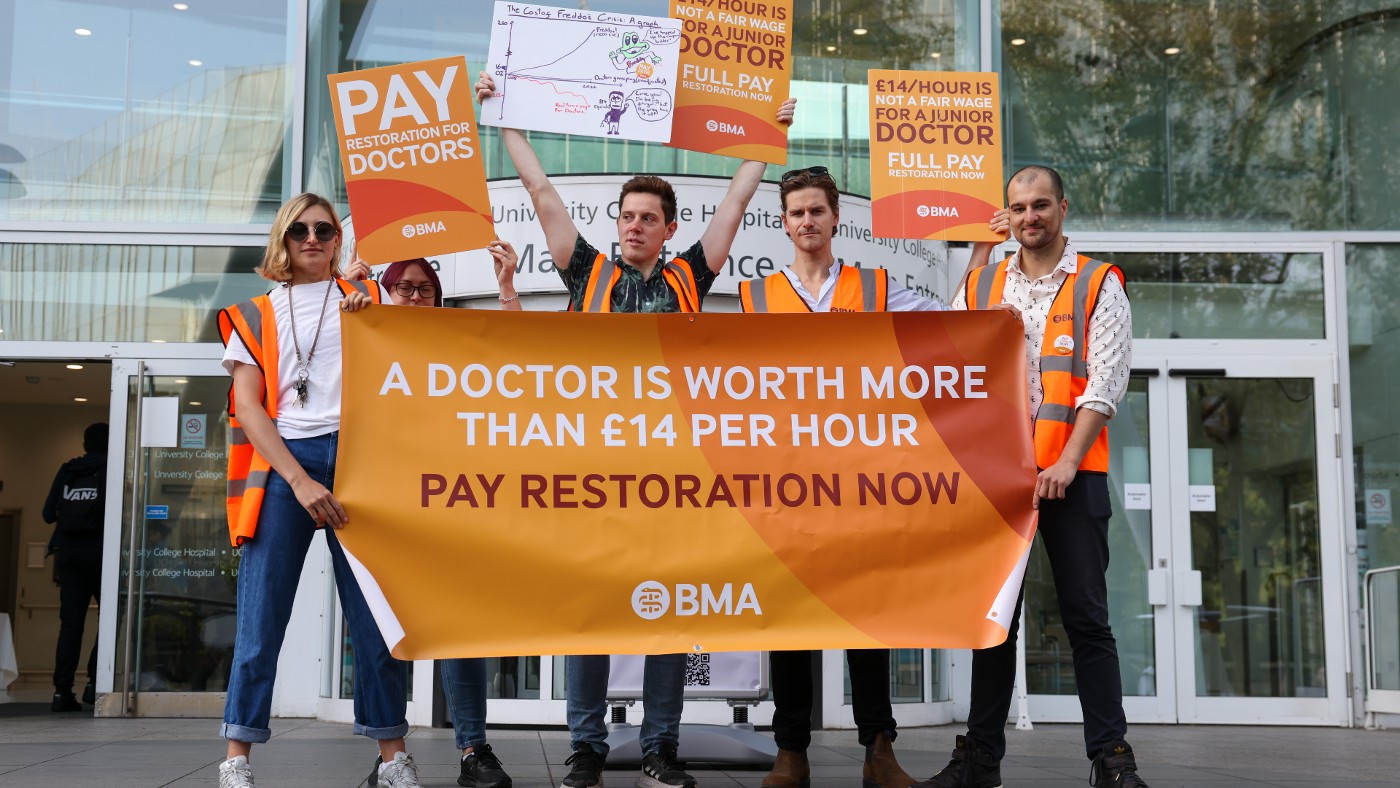Public-sector pay: where can Rishi Sunak find the cash to stop the strikes?
Prime minister has ruled out borrowing but critics say he is ‘distorting the truth’

A free daily email with the biggest news stories of the day – and the best features from TheWeek.com
You are now subscribed
Your newsletter sign-up was successful
The government is expected to announce today whether it will approve pay increases of 6-6.5% for public-sector workers.
Rishi Sunak has hinted that he might reject the official pay review body’s recommendation for teachers, junior doctors, police and other public-sector workers.
This would “prompt fresh tensions with unions”, said the BBC, “raising the prospect of continuing public-sector strikes”.
The Week
Escape your echo chamber. Get the facts behind the news, plus analysis from multiple perspectives.

Sign up for The Week's Free Newsletters
From our morning news briefing to a weekly Good News Newsletter, get the best of The Week delivered directly to your inbox.
From our morning news briefing to a weekly Good News Newsletter, get the best of The Week delivered directly to your inbox.
But signing off on a 6.5% pay rise would create another problem: where Sunak and his chancellor would find the cash to fund it.
What did the papers say?
Jeremy Hunt has “refused to cover any extra increases with more borrowing”, noted The Telegraph, as he believes that could “fuel” inflation. “Borrowing is itself inflationary”, said the chancellor this week.
Instead, he has ordered ministers to find between £2bn and £3bn of cuts to fund the pay rises. Hunt’s “edict” has “provoked a flurry in Whitehall to find savings”, said the Financial Times, with warnings from some ministers that the cuts would damage “already-stretched public services”.
A source told the paper that “the conversations are live” and the “bleeding stumps are out”, referring to the tendency of ministers to issue dire warnings of the consequences of cuts.
A free daily email with the biggest news stories of the day – and the best features from TheWeek.com
Without resorting to borrowing, offering pay increases of 6% or more would “eat into the budgets” of Whitehall departments, agreed the i news site.
But Unite general secretary, Sharon Graham, told the site the choice doesn’t have to be between borrowing or cuts, and Sunak “could start by looking at the money made by profiteering companies that have been driving up inflation”.
“They want us to think that the choice is between the devil and the deep blue sea,” she added, but this is “simply not true”.
Unison magazine has accused the government of “distorting the truth”. The union’s policy officer, Guy Collis, said the government recorded a budget surplus of more than £5bn in January 2023, and government borrowing is currently £30bn less than forecast.
“So the money is there”, he wrote, “it just needs government to make health workers its priority”.
A former speechwriter for Tony Blair also believes the issue is simpler than presented by the government, arguing that Sunak “can sort the strikes if he just stops playing small-time politics” by trying to leverage strikes to dent the popularity of Labour.
Writing for the Evening Standard, Philip Collins warned that “soon there will be a parade of strikes and the feeling that no service in Britain is working”. The “initial union demands are too high, of course”, he wrote, “but this is a negotiation”.
What next?
Sunak and Hunt’s decision will come “against a backdrop of a doctors’ strike, a weak economy and persistent high inflation”, noted The Guardian.
As junior doctors begin a five-day strike in England today, the longest walk-out of its kind in the NHS’s history, pressure is mounting for the government to bring an end to the repeated industrial action.
But with inflation currently at 8.7%, Sunak – who has promised to cut it to about 5.3% by the end of the year – wants to avoid pay increases which could “fuel a wage-price spiral”, said the paper.
He has indicated they could overrule the pay review bodies, arguing they need to make difficult decisions in a bid to halve inflation.
In an interview with the BBC’s Sunday with Laura Kuenssberg, Sunak said he was determined to make “affordable” and “responsible” decisions on public-sector pay, which “may not always be popular in the short term”, noted The Telegraph.
He said there was “no point” in him “doing something that sounds popular and nice today, for example on public-sector pay” because he “would be giving with one hand” and “taking with the other through higher inflation and interest rates”.
But Sky News said “it has now been widely suggested” that Sunak will back pay rises of around 6% for public-sector employees in 2023-24. Each department would then publish the independent review body reports and endorse their recommendations.
The rises “could potentially halt further strike action”, said the broadcaster, but “this decision is ultimately down to unions and their members”.
Chas Newkey-Burden has been part of The Week Digital team for more than a decade and a journalist for 25 years, starting out on the irreverent football weekly 90 Minutes, before moving to lifestyle magazines Loaded and Attitude. He was a columnist for The Big Issue and landed a world exclusive with David Beckham that became the weekly magazine’s bestselling issue. He now writes regularly for The Guardian, The Telegraph, The Independent, Metro, FourFourTwo and the i new site. He is also the author of a number of non-fiction books.
-
 Palestine Action and the trouble with defining terrorism
Palestine Action and the trouble with defining terrorismIn the Spotlight The issues with proscribing the group ‘became apparent as soon as the police began putting it into practice’
-
 Why is the Trump administration talking about ‘Western civilization’?
Why is the Trump administration talking about ‘Western civilization’?Talking Points Rubio says Europe, US bonded by religion and ancestry
-
 Quentin Deranque: a student’s death energizes the French far right
Quentin Deranque: a student’s death energizes the French far rightIN THE SPOTLIGHT Reactions to the violent killing of an ultraconservative activist offer a glimpse at the culture wars roiling France ahead of next year’s elections
-
 How are Democrats turning DOJ lemons into partisan lemonade?
How are Democrats turning DOJ lemons into partisan lemonade?TODAY’S BIG QUESTION As the Trump administration continues to try — and fail — at indicting its political enemies, Democratic lawmakers have begun seizing the moment for themselves
-
 How did ‘wine moms’ become the face of anti-ICE protests?
How did ‘wine moms’ become the face of anti-ICE protests?Today’s Big Question Women lead the resistance to Trump’s deportations
-
 How are Democrats trying to reform ICE?
How are Democrats trying to reform ICE?Today’s Big Question Democratic leadership has put forth several demands for the agency
-
 Why is Tulsi Gabbard trying to relitigate the 2020 election now?
Why is Tulsi Gabbard trying to relitigate the 2020 election now?Today's Big Question Trump has never conceded his loss that year
-
 Will Democrats impeach Kristi Noem?
Will Democrats impeach Kristi Noem?Today’s Big Question Centrists, lefty activists also debate abolishing ICE
-
 Do oil companies really want to invest in Venezuela?
Do oil companies really want to invest in Venezuela?Today’s Big Question Trump claims control over crude reserves, but challenges loom
-
 What is China doing in Latin America?
What is China doing in Latin America?Today’s Big Question Beijing offers itself as an alternative to US dominance
-
 Why is Trump killing off clean energy?
Why is Trump killing off clean energy?Today's Big Question The president halts offshore wind farm construction